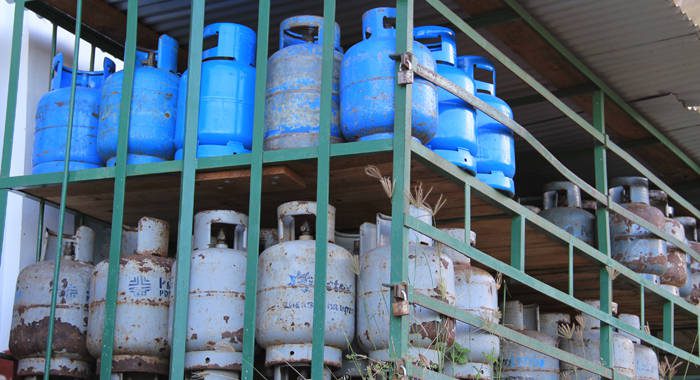The government on Wednesday announced a new price regime for liquefied petroleum gas (LPG), which has set new prices for the commodity, commonly known as “cooking gas”, effective yesterday, Sept. 1.
Permanent Secretary in the Ministry of Trade, Nathaniel Williams, also announced on Wednesday that his ministry will put steps in place to ensure that resellers of LPG adhere to the prices, adding that the ministry is aware of price gouging in the market.
The senior public servant said that a 20lb cylinder of LPG will cost $31 in Zone 1; $32 in Zone 2; $33 in Zone 3; and $36 in Zone 4.
Zone 4 is The Grenadines and transporting the filled and empty LPG cylinders accounts for the elevated price, relative to the rest of the country.
For the 25lb cylinder, the cost in Zone 1 is $37.49; Zone 2 is $38.49; Zone 3 is $39.49; and Zone 4 is $42.49.
For the 100lb cylinder, the cost in Zones 1, 2 and 3 is the same, $149.94.
Consumers in The Grenadines will pay $170.94.
Williams noted that the government had in 2015 reduced the price of LPG in keeping with the falling prices of oil internationally.
“There were some developments consequently, which most of the importers felt that the prices which were set were not adequate enough to maintain them or satisfactory for them to operate within the market,” he said at the press briefing, which was also attended by the manager of the two private sector distributors of LPG.
Williams said that since the initial price adjustment in the market, the relevant state agencies have been meeting.
He said that the new prices were not set unilaterally by the government, but were agreed by the major players.
The trade official said he believes the new mechanism will work, as it shows social partnership.
Some resellers of LPG have been selling the product at higher prices than those approved by the government, saying that the prices set by the government had reduced profit to the point of elimination.
Williams said: “… I’m speaking specifically of those who sell the products. We know, based on the price control, the Distribution and Sale of Goods Act, that LPG is a price control good. We are also aware that many persons resell the product at prices way beyond the price control set by government. And most if not all of these occurrences take place without receipts being given to the buyers.”
“We expect … that the prices will be adhered to. Of course, with that issue, we are sensitising the consuming public that cooking gas is not just an economic product. Cooking gas is what we call a sensitive product. It is used by the rich, the middle class, the poor, and the indigent. So, where it is not available, people will find other types of fuel.”
He said that with the reality of climate change, the forest is under severe stress and there is a need for the government to reduce the cutting of trees.
“Hence, the government is concerned about ensuring that cooking gas is available and affordable to the satisfaction of all the parties concerned.
“We will, therefore, expect the sellers to issue a receipt to the buyer and my ministry is expected to police and ensure that all resellers adhere.”
He noted that the prices that are set are only for retail purchases, adding that the internal mechanism of the importer and the wholesalers will deal with other prices.
“I am, therefore, calling on all resellers, ensure that when you sell this product we adhere to the price and distribution of products act, which speaks to issuing receipts.
“My officers are already being advised that they need to visit the various resellers and to ensure that they adhere to this price. Arrangements are made with the Attorney General’s office that persons who are caught breaking the law in selling the good beyond the price that was set — and the price was not just set, the price was negotiated — will be brought to justice in the swiftest way possible,” Williams said.
“We need to ensure that this good is available and affordable. The indigent should be able to buy a bottle of cooking gas at a price that is reasonable both to the indigent household and to the reseller, and that’s why these prices are set as they are.”






